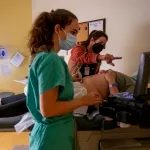Indiana’s Medical Licensing Board ruled late Thursday that Dr. Caitlin Bernard, who performed an abortion last year for a 10-year-old rape victim who traveled from Ohio to Indiana to obtain the procedure, violated patient privacy when she spoke to a reporter about the patient.
The case became a national lightning rod in the debate over abortion access after the Supreme Court overturned Roe v. Wade through its June ruling on Dobbs v. Jackson Women’s Health Organization.
Hours after the SCOTUS decision, which immediately granted states the power to control their own level of access to abortion, Ohio moved quickly to ban abortions after six weeks of pregnancy.
As a result, about a week later, the 10-year-old girl and her mother traveled across state borders to seek an abortion with Bernard. According to the IndyStar, the victim was approximately six weeks and three days into her pregnancy.
At a reproductive rights rally at the end of June, Bernard spoke to a local news reporter about the case and the story was published in the IndyStar. It subsequently went viral and was picked up by national news outlets. At the time, Indiana Attorney General Todd Rokita went on Fox News and referred to Dr. Bernard as “an abortion activist acting as a doctor.”
In July, Rokita opened an investigation into whether Bernard had violated the Health Insurance Portability and Accountability Act (HIPAA), a law that protects patient privacy, by speaking to a reporter about the incident, as well as whether Bernard had properly reported the child abuse in the state of Indiana.
He filed a complaint that led to Thursday’s hearing by the Medical Licensing Board, where the attorney general’s office brought forward five counts related to the complaint. The fifth count stated that if any of the first four were proved, then Bernard was “unfit to practice” and should have her medical license suspended.
Throughout the hearing, the attorney general’s office repeatedly brought up Bernard’s advocacy work around reproductive rights in an attempt to link her motives to a violation of HIPAA.
When questioned about her advocacy work on reproductive rights, Bernard, an OB-GYN, said she felt it was her ethical obligation to inform Indiana residents about the public health impacts of a law that was going to be decided by state legislators in a special session that summer.
“I think that it’s incredibly important for people to understand the real world impacts of the laws of this country about abortion or otherwise,” she told the defense during questioning. “I think it’s important for people to know what patients will have to go through because of legislation that is being passed. And a hypothetical does not make that impact. It does not help people understand what is happening.”
At one point a lawyer representing the attorney general asked her if she was pursuing a political agenda, to which she responded: “I don’t consider that to be a political agenda at all in my estimation, as I think it is the same for all physicians, abortion is not a political issue.” She added, “Abortion is part of comprehensive reproductive health care and needs to stay squarely in the realm of reproductive health.”
Indiana passed a near-total abortion ban in August that is currently being challenged in court. In the meantime, abortions are legal up to 22 weeks after the last menstrual period.
The state also tried to argue that Bernard failed to properly report child abuse to the Indiana authorities. Bernard said at the hearing that when she spoke to the Ohio doctor who initially saw the victim, that doctor had already reported the child abuse to Ohio authorities and law enforcement was present on that phone call. Her lawyer stated that under Indiana law, abuse has to be reported to authorities local to where the abuse took place, which was Ohio.
She also contacted a social worker at Indiana University Health, where she worked, to report the incident, as per hospital policy. Bernard also filed a terminated pregnancy report to the Department of Child Services.
Both parties brought expert witnesses that had backgrounds in privacy compliance and HIPAA.
The attorney general’s expert witness, Andrew Mahler, who had previously worked at the Department of Health and Human Services Office for Civil Rights said that in his opinion Bernard violated HIPAA in two instances, by telling another physician at a reproductive rights rally about her patient and by talking to a reporter.
“From [the Office for Civil Rights] perspective, I think it would be fair to say disclosure to the media is treated with some higher sensitivity,” he said.
Bernard’s lawyers argued that the information she did disclose, including age, state of residence and health condition was not a violation of HIPAA.
After many hours of testimony the board ultimately found that Bernard did violate state and federal privacy laws but cleared her on two counts: one for failing to report child abuse and another that would have deemed her unfit to be a doctor.
The board voted on a motion for a letter of reprimand and Bernard was fined $1,000 per violation, totaling $3000.





